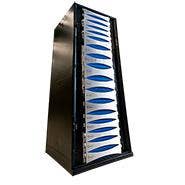Tegile Intros New Tiered All-Flash Array, Debuts New Low-End Model

All-flash storage array vendor Tegile Systems on Monday expanded its product line card with an array containing both a performance-focused flash tier and a lower-cost, capacity-focused flash tier.
The Newark, Calif.-based company also looked to expand its target market with the introduction of a new version of its entry-level model that cuts the base configuration to 5 terabytes.
The newest high-end version of Tegile's IntelliFlash HD all-flash array can deliver up to 5 million IOPS and 10 petabytes of capacity in a single rack, and at its maximum configuration costs as low as 50 cents per gigabyte after deduplication and compression, said Rob Commins, vice president of marketing for the company.
[Related: The 10 Coolest Flash Storage And SSD Products Of 2015]
"We're taking dense flash for capacity, and putting a layer of high-performance flash on top," Commins told CRN. "The result is an all-flash array with two tiers."
A tiered all-flash array allows two major capabilities, Commins said.
First, midrange companies now have the kind of price that lets them move their entire data center to an all-flash architecture, he said. "At 50 cents per gigabyte, that's the price of disk arrays," he said.
Second, larger companies can use the new IntelliFlash HD arrays to replace multiple solutions, Commins said. "This makes sense for, say, a bank to store check images," he said. "We're also doing a lot with users of analytics technologies like Splunk. These companies have been using high-performance flash combined with lower-cost storage tiers using technologies like EMC's Isilon. Now they can do it all on a single platform."
Tiered all-flash storage is a concept that sophisticated data center customers will understand right away, said Charlie Collins, director of sales at Secure Data Technologies, an O'Fallon, Ill.-based solution provider and Tegile channel partner.
"But you will have to have the right audience," Collins told CRN. "We're talking to Fortune 500 companies who are looking for the performance and capacity to run SQL databases. We have three big accounts looking at their SQL databases, and the performance element is on their minds. That's why they're looking at IntelliFlash HD."
Tegile has also received a lot of feedback from customers looking for a new lower entry into the all-flash storage array market than the company's previous model, which started at 10 TBs of capacity, Commins said. As a result, the Tegile line now starts with a model featuring 5 TBs of performance flash, he said.
"Analyst firm Gartner tells us the median capacity point for all-flash arrays is 10 TBs," Commins said. "That was our starting point. So we missed out on a big part of the market."
Collins agrees that Tegile was missing out on sales before introducing its 5 TB entry-level model.
"If I can go into a customer and replace an existing EqualLogic or Compellent or any other vendor's solution with an entry-level all-flash array, that's a beautiful opportunity," he said. "Tegile now lets us scale down to compete with legacy storage."
That is a big potential market for Tegile and for Secure Data Technologies, Collins said.
"We're in the St. Louis area, with a lot of manufacturers and white collar organizations with under 10 TBs of storage," he said. "Many of these businesses are not real sophisticated in their IT, and replace their technology every three years. So this is a good time for us to get the new Tegile solution."
Collins said that Tegile has proven to be a good partner on the channel side. "I tell my other vendors they need to get to the kind of place Tegile is on the channel," he said. "They partner well, supporting us and not oversaturating the market. I have a lot of other vendor partners who over time get to the point where the only way for them to grow is oversaturate the market with channel partners."